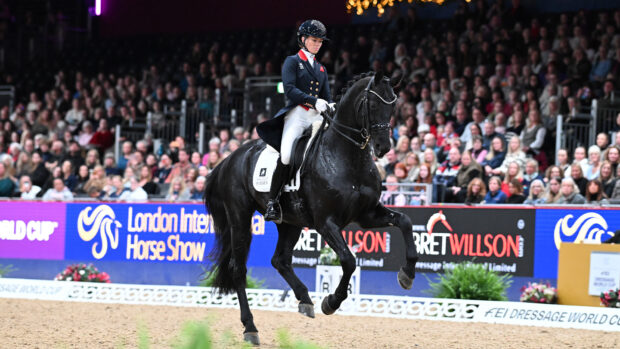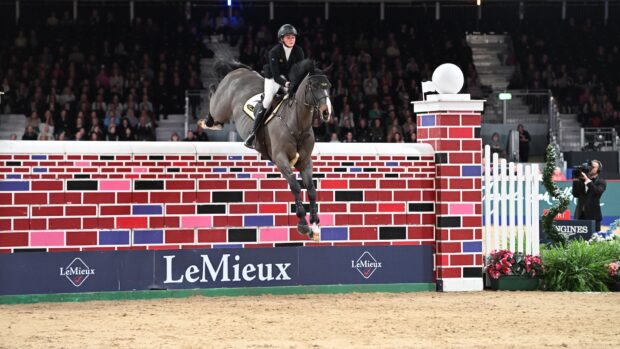As a spotlight is thrown on the lack of ethnic diversity in the British equestrian industry, H&H investigates what action is being taken to address the issue...
“I’ve had people stop me to say: ‘I didn’t think Black or Asian people rode horses’. It’s about changing that mindset.”
Imran Atcha, who runs St James City Farm Riding School in Gloucester, told H&H he has often been approached, when riding, by people who had never thought they could sit on a horse – and want to try.
He believes this lack of awareness is a major factor in the lack of ethnic diversity in British equestrianism – which he and others are working to change, to improve accessibility to our sport for all.
“We need role models,” Imran said. “We need someone who people in the area can relate to. If they see someone from the same background, they can relate to that person, but if everyone appears to be the same type, and wealthy, there’s a feeling riding is only for wealthy people – and for the ethnic minority community, it’s multiplied. When they see someone like me, that I can ride and am willing to help others into the sport, and there are other people like me, it’s easier.”
Imran believes change has to come from the grassroots level; the top riders of the future have to start at the bottom, but these potential equestrians have to be inspired, to know it is possible for them, to take the sport up in the first place.
He cites Peckham teenager Khadijah Mellah’s 2019 victory in the Magnolia Cup – the first time a British Muslim had ridden a winner in the UK, and the first time anyone had raced in a hijab – as an inspiration.
“People from minority communities, second or third generation, might not have heard of Carl Hester or AP McCoy, but they’ve heard of her,” he said. “That’s the first step.”
Khadijah learned to ride at Ebony Horse Club in Brixton, another city riding school aiming to make horses accessible to those who may not otherwise have had the opportunity.
Like Imran, Ebony’s co-founder Naomi Howgate is involved with a new British Equestrian (BEF) initiative set up last autumn, the equality engagement group, which the BEF hopes will help it engage with people already working in the area to “help us provide equal opportunities for all to take part in equestrian sport, and to make what we do more accessible”.
Imran said Khadijah’s story shows the importance of schools like Ebony, but that many such organisations are in a “vacuum”. BEF head of participation Anna Hall told H&H the equality group wants to help connect and support these organisations in their work.
“We have challenges, but the way we’re approaching them is through these groups – to link people who can drive action,” she said. “We don’t want the BEF to plan a misguided project; there’s nothing worse than a bunch of well-meaning people saying, ‘This is what we think you want’; the idea is to support people. It might take more time, but it’ll deliver a better result.”
The first group meeting was held last autumn, to find out about the barriers to accessing the sport. The next session, planned to start addressing the issues, was due to be held this spring, but was delayed by the coronavirus.
Anna said the barriers cited were much as expected – cost is a major factor in accessing riding, perception of elitism – but geography is also a major barrier. Rural areas, in which horses are most often found, are also generally those with the lowest proportions of BAME residents.
“We know that if riding schools go into urban areas, people are interested, and want to be involved,” she said. “The love of horses goes across all races.”
Dressage Olympian Emile Faurie set up the Emile Faurie Foundation 14 years ago to help children access riding who may not otherwise have been able to.
“One of the first programmes we did was in Birmingham; we took a couple of horses to a location and the children came out to see them,” he told H&H.
“There was a Black girl who stayed at the back, and when we encouraged her to come forward, she said, ‘I can’t’. I asked why not and she said, ‘Black people don’t ride’. That really struck a chord.”
Emile’s foundation sponsored a young Black rider to complete a college degree in equine studies, and he believes, and hopes, diversity in equestrianism is moving in the right direction.
“It boils down to money,” he said. “If we can get more funding, we can help more kids ride.
“We require school attendance from children [who take part], and we’ve had so many letters from schools about the incredible difference it’s made to children when they get the opportunity to ride, on attendance and concentration. Especially children from minority groups; it integrates them so much more and gives them more confidence.”
Lydia Heywood, a 23-year-old event rider who grew up in Britain and rides for Jamaica, currently at two-star level, said she “puts a lot of thought into ideas that could make a difference”.
“Thankfully my mum has given everything to get me where I am, but funds to build a competitive string and train towards the Olympics need establishing now,” she told H&H.
Lydia works with Ebony, giving her time free of charge as much as possible, and is keen to be involved with the BEF work. She created her Cool Ridings project, which will aid her aims to grow a bursary scheme for young riders.
“There’s a link missing between the foundations and competitive riding; there’s not enough diversity on the circuit,” she said.
“I make trips to Ebony and have trained groups in Jamaica; there’s a lot of natural ability and passion – I’d like to inspire other people into the sport.”
Lydia, who said “children can’t be what they don’t see”, wants to “reveal the avenues of hope in the equestrian world” and has been working with St James.
“Since Pony Club days, I felt people double-take seeing me on a horse, but it never upset me,” she added. “I’d like to think it’s a positive thing, and let my riding and smiling do the talking.”
Lydia’s grandparents are from Jamaica and she believes we will see more diversity at the elite level of the sport in the next generation; “But I’d love to see more help for people now,” she said.
Another figure working with the BEF is Reece McCook, a mixed-heritage rider who has launched the Ride out Racism campaign.
The 18-year-old told H&H he has wanted to be an eventer since childhood, so completed a college course and then went to work on a yard – but left after he was racially abused.
“I wanted to give up riding as I felt I wasn’t the right stereotype,” he said. “After a lot of encouragement, I picked myself up, and had the idea to start the campaign to try to defeat the barriers I and other ethnic minorities face. Racism is still there in our sport.”
Support for others
Reece said he wants riders to know they are not alone, and that there is support and people to talk to, for others in his situation.
“It had never been as direct as that one incident, but growing up, and say, going to tack shops, I always felt I stuck out like a sore thumb,” he said. “Even at college, people would ask if I was sure this was what I wanted to do, or if I’d ridden before; [racism] was implicit in what was said.
“There are so many barriers that need to be broken down, and with all the Black Lives Matter coverage, I thought it the perfect time to see what I can do to open doors for people.
“So many people have come forward to tell their stories; it’s empowering to know you’re not alone. Horses bring so much good; everyone should have the chance to get involved, whatever their heritage or background.”
Reece hopes to promote cohesion and raise awareness of issues, including helping to dispel the stereotype of a typical rider. He feels social media can play a big part, and also hopes to encourage equestrian brands to feature riders from underrepresented ethnic backgrounds in their imagery.
“It looks like the industry is willing to listen, and open to change, which is good,” he said.
Dannie Morgan, an advanced eventer and grand prix dressage rider, has had a more positive experience than some. He told H&H he has never experienced any discrimination, or felt different to others in his sport, praising the governing bodies for their support of his career.
Imran added: “There’s much more to be done. We need more capacity; people with the passion to act may not have the paperwork skills, and need to be hand-held. I’d like to see organisations like ours elsewhere, offering affordable riding to everyone.
“But I’m an optimistic person. With the BEF approach, that can filter down through the disciplines and they can lead the way. That gives me hope.”

Increasing diversity in UK equestrian sport: useful links
Want to share your views? Email hhletters@ti-media.com including your name and nearest town for the chance to be featured in the letters page of a future issue of Horse & Hound magazine…




